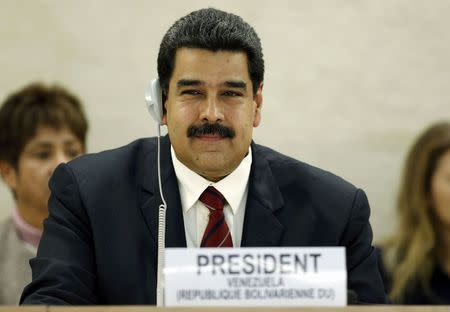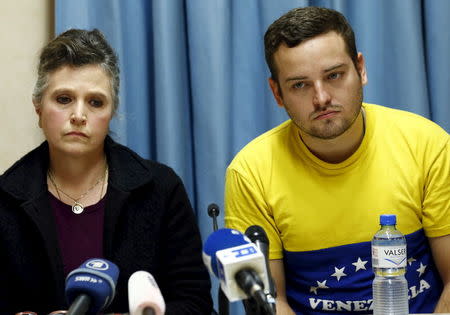Maduro defends record at U.N. rights forum, blasts U.S.
By Stephanie Nebehay GENEVA (Reuters) - President Nicolas Maduro defended Venezuela's human rights record in Geneva on Thursday after the top United Nations rights official voiced serious concerns about the country's judiciary and harassment of his critics. In a 45-minute speech to the U.N. Human Rights Council, Maduro praised the benefits of Venezuela's socialist policies and decried what he called the "ongoing harassment of the imperialist powers of the United States". Before he spoke, U.N. High Commissioner for Human Rights Zeid Ra'ad Al-Hussein told the forum in a video of his "serious concerns about the independence of the judiciary in Venezuela, the impartiality of judges and prosecutors and the pressures they face in handling politically sensitive cases". Zeid also spoke of "concerns, which I share, about intimidation, threats and attacks against journalists, human rights defenders and lawyers". Maduro brushed off the criticism, saying this was "not the first time a civil servant has sent an audacious message taken from the global agenda of harassment and careless attacks". Venezuela has not allowed U.N. human rights officials to make a fact-finding visit to the country since 1996, U.N. officials said. The Venezuelan leader arrived from a summit of Arab and South American leaders in Riyadh where he pressed for a meeting of oil producers to help bolster prices. "There are new attacks against Venezuela, despite a year 2015 that has been difficult, with economic warfare because the price of our oil export plummeted by 60 percent, we will be showing record reductions in abject poverty," he told the forum. Venezuelan opposition activists had called on U.N. member states to boycott his speech. Ambassadors from major Western countries stayed away and no other delegations to the 47-member forum were able to take the floor during the session. . Two of Maduro's relatives have been indicted in the United States for cocaine smuggling, according to New York court papers on Thursday, following an international sting that Caracas cast as an "imperialist" attack. In a tweet earlier on Thursday, Maduro condemned what he called imperialist attacks and ambushes, in what appeared to be his first public reference to his relatives' detention. His wife Cilia Flores was among 115 Venezuelan officials accredited for the Geneva event and declined to answer reporters' questions about her nephews' indictment. Maduro accused Western states of manipulating the human rights issue to pressure Venezuela. "It is used in the West in order to try to mark our country, isolate our country," he said. U.S. spokesman Paul Patin told reporters Maduro's address was "a transparent attempt to use the U.N. Human Rights Council to shift attention away from his government's own actions". He cited "persistent reports of excessive use of force, torture and other ill-treatment and arbitrary detentions". In his speech, Maduro mentioned the parliamentary elections due on December 6, saying the results would be audited. (Reporting by Stephanie Nebehay; Editing by Tom Heneghan)




